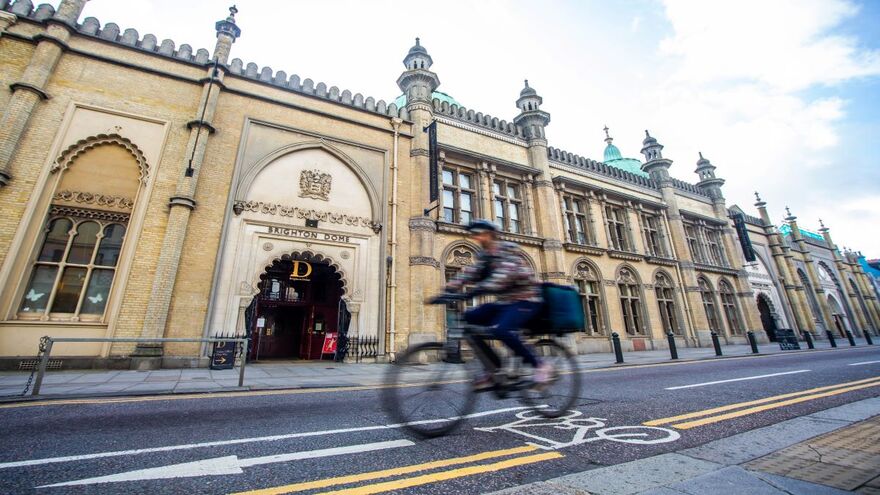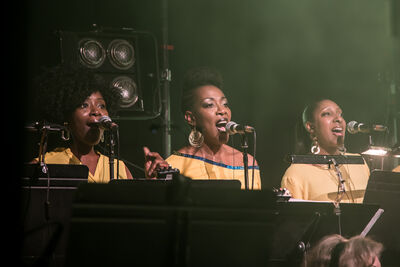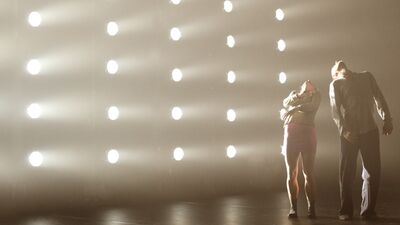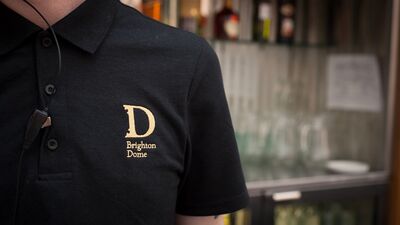
Supporting the Environment
Our Organisation
Brighton Dome & Brighton Festival (BDBF) is a registered charity employing 150 permanent employees and many more hourly paid staff, freelancers, volunteers and creatives.
We are funded by the Arts Council England, The National Lottery Heritage Fund, Brighton & Hove City Council and the generous donations of corporates and individuals. We also very much rely on commercial income from venue hires, bar sales, catering and merchandise to support the core objectives of the organisation.
The purpose of BDBF is to enable extraordinary arts experiences where people come together to enjoy, imagine, create and change.
We reach audiences annually of 670,000 across all art forms presented in the Brighton Dome venues and at the annual Brighton Festival each May.
The Brighton Dome venues are Grade 1&2 listed with a rich history which has recently been restored through the capital redevelopment of the Corn Exchange and Studio Theatre. The project made sensitive and modern interventions which make us more environmentally sustainable.
At the very heart of our activities is our aim to run an ethical organisation, where our legacy is a positive one and we can use our influence to encourage socially conscious behaviour in all those we interact with. This includes the need to recognize and address the climate emergency and we aim both to reduce our own impact and to encourage everyone who connects to us to take responsibility for their impact to the environment too.
We believe that every member of staff has an important role to play in making BDBF more environmentally sustainable and that sustainability should be woven through every decision taken to invest in consumables and equipment, to work with contractors and to engage with artists.
2030
In June 2019 the UK Government committed to bringing all greenhouse gas emissions in the UK to NET ZERO by 2050, with the view to prevent global temperatures from increasing more than 2 °C (ideally no more than 1.5°C) above the temperature benchmark set before the beginning of the Industrial Revolution.
BDBF is looking towards 2030 when we aim to reach net zero in our own operations. 2030 acts as a milestone to 2050. We will also by 2030 have firmly embedded the expectations we will set for our suppliers and value chain.
Being environmentally sustainable goes hand in hand with being financially sustainable; as we seek to reduce our environmental impacts and protect the planet’s future for the next generations, we reduce the financial burden to the organisation and protect our own.
Our Main Impacts
- Audiences – How our audiences choose to travel to events at Brighton Dome and during the Brighton Festival represents the most significant C02 impact arising from our business.
- Buildings – The nature of live entertainment means that electricity consumption creates one of the organisation’s other main carbon impacts. Although improvements to areas as part of the capital redevelopment have taken place, as the Brighton Dome was constructed in 1806, it is not as energy efficient as modern buildings.
- Catering – Running bars and catering operations sustainably requires thought and commitment.
Our Commitments
BDBF has developed an environmental action plan which is made up of over 100 initiatives both large and small, all of which help us to be a more sustainable organisation. Here are a selection of the actions we are taking.
We aim to align our environmental action with that recommended by the ‘Theatre Green Book’ baseline which represents best practice for environmental sustainability.
Energy & Water
- We measure and monitor the venue’s consumption of gas, electricity and water, using the Arts Council via Julie’s Bicycles Creative Climate Tools to understand our carbon footprint and track progress to reduce this.
- We make the additional investment annually to purchase 100% renewable REGO backed electricity.
- We’reworking with our staff to reduce energy consumption and seek to invest in removing the remaining non LED lighting in the Concert Hall.
- We are working with engineers to understand how decarbonisation technology could allow us to transition away from gas heating before our deadline of 2030.
- The amount of mechanical and electrical equipment we run at any time is reduced and monitored through Building Maintenance Software, running the buildings as efficiently as possible.
- We’ve relocated our team to modern, more environmentally sustainable office accommodation alongside encouraging hybrid working.
Waste
- We reduce consumption by reusing where possible and recycling. We collect our staff and bar food waste for composting. In 2023-24 we achieved a recycling rate of 75% at the venues.
- The remaining general waste was sent to a heat recovery centre, diverting this away from landfill.
- We use e-tickets which saves approx. 250,000 printed paper tickets, ink, electricity and also the post office collection and delivery travel impacts.
- We’re on the way to ridding the venues of single use plastic. Our bars have banished bottled water, saving around 10,000 bottles per year and are serving drinks in reusable cups or in glass saving around 250,000 disposable plastic cups from needing recycling.
- We print on recycled paper, reduce unnecessary packaging of brochures and keep a close eye on the amount of print we produce, maximizing digital technology. Any leftover print is always recycled.
- Promotional materials such as banners are designed in such a way as to be re-usable and not be binned after each Festival or project.
- We find ways to reuse our sets – The Riwaq was built as a unique performance space for Brighton Festival 2022 and was found a new home.
Travel
- 49% of BDBFs carbon footprint was created through audience travelling to events. We’re encouraging audiences to reduce car usage and where they cannot walk or cycle readily to us, to use public transport. In 2023/24 we were pleased to see that 59% of our audience chose to travel sustainably on foot, by cycling or using public transport, an increase from the previous year's 53%
- BDBF uses Modeshift to track our travel plan targets.
- Many of BDBFs staff are working partially at home, saving on carbon impact of the daily commute.
- We think before travelling to do our business, utilizing online meeting technology wherever we can. Where business travel is unavoidable we are choosing the most sustainable means to getting there and recognising this impact within our carbon footprint.
- We encourage our staff to commute to work sustainably through schemes such as BetterPoints which incentivizes sustainable travel, sustainability competitions and by providing loans for bicycles, providing staff showers, and promoting walk/cycle maps.
Procurement
- We support and apply the principles of the Social Value Act 2012 through our procurement of services and products and make economic, social & environmental benefits to the community core aims within our everyday work. How our suppliers think about sustainability matters to us and forms a part of our procurement process.
- We ensure that all maintenance & redevelopment projects explicitly include environmental considerations and liaise with architects and contractors to ensure compliance. The redevelopment will achieve the equivalent of the BREEAM very good rating.
- Sustainability formed a key part of the tender process to find our new restaurant partner Red Roaster who are rated in the top 20 sustainable businesses in the UK. They hold the highest award from the Sustainable Restaurant Association.
Communications
- We communicate our mission and encourage others to recognize and respond to the climate emergency. We engage with our staff, artists, stakeholders, audiences and our community on sustainability issues.
- 60% of our permanent staff have received accredited Carbon Literacy Training, embedding our organisational objectives and a planet positive approach away from work.
- We actively participate in national & local networks committed to reducing impacts across the arts, sharing experiences and resources, all with the common goal to reduce our carbon impact and be more planet positive.
- We programme work exploring environmental themes.
This policy is supported by our Environmental Action Plan. The action plan is informed by our environmental monitoring and measurement and fed by the passion and creativity of our Management Team and Green Team representatives.
The Action Plan is reviewed and updated annually by the Management Team and Green Team.
The organisation has in place key performance indicators relating to environmental sustainability which are to reduce our carbon footprint, reduce waste, reduce travel impacts and align with the Theatre Green Book standards. The key performance indicators are monitored quarterly and reported to our Board of Trustees.
This Statement and our environmental action plan have been communicated to all staff of Brighton Dome & Brighton Festival. The Statement is available to the public via our website, promoted through our Environment section.
This Policy Statement is endorsed by
Maxine Hort
Interim Chief Executive, Brighton Dome & Brighton Festival
Last reviewed October 2024



